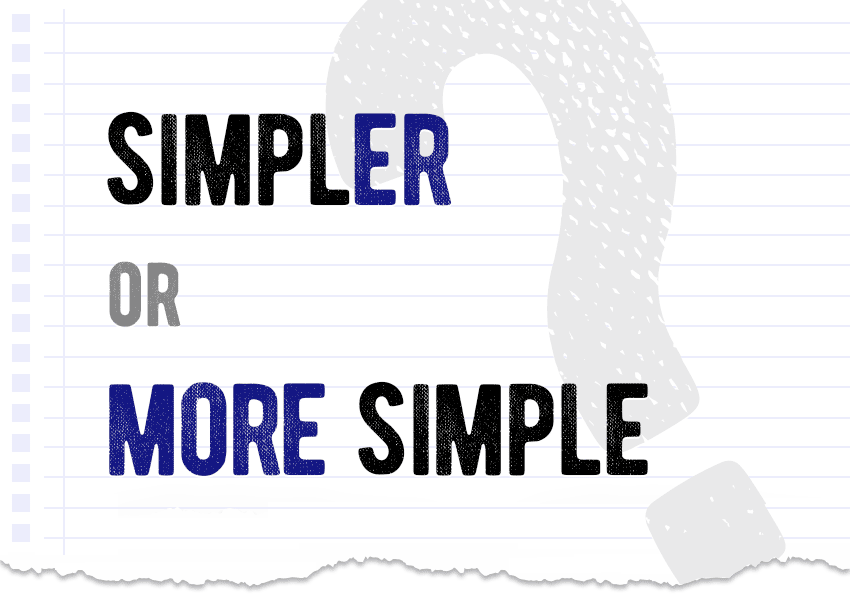Simpler or more simple – which one is correct?
There are many rules to consider in English grammar. In some cases, you should add -r or -er to the end of the word. Other times, you ought to resign from adding anything to the end and use “more” before the word instead. What does it look like in the case of the word simple? Which form to use in a comparative statement with this adjective – more simple or simpler? Which one is the correct form and how do the phrases differ? Is it correct to use the word more with comparative adjectives? Is simpler a word or maybe there is a simpler way of saying it? Let’s find out together!

READ ALSO:
- Is it nosey or nosy? – Which one is correct?
- Journeys or journies – What is the plural of journey?
- Atleast or at least – Which one is correct?
- Time flies or time flys – Correct spelling
- Weather or whether or wether – What is the difference?
More simple vs simpler – which form is correct?
Both simpler and more simple are considered correct when it comes to casual conversation. A native English speaker may have an opinion on which one sounds better. However, simpler is regarded as the better comparative form, especially in formal writing. Remember that consistency is key – the first time you have to use it, make a choice and go with it until the end of the text. Simpler is perfectly acceptable and has the advantage of expressing the same thing in fewer words. It should be pointed out that simpler is a much better option, taking into account that the root adjective “simple” has two syllables.
You should know that two-syllable adjectives ending in -le, -er, or -ow take -er to form the comparative form (which means this two syllable rule applies to simple). That’s why we do not recommend using more simple in formal situations if you want perfect grammar – depending on which of the two things you use, the phrases will differ in formality. More simple is not the most grammatically correct way to create the comparative adjective, because “more” is used with adjectives that have three syllables, and not with two syllable words, “simple” being one of them.
READ ALSO:
- Shiney vs shiny
- Choosing vs chosing – Correct spelling
- Cheff vs chef – Which one is correct?
- Successfull meaning and correct spelling
- Who’s whos and whose – What is the difference?
What’s the meaning of simpler and more simple?
Simpler more simple means more easily understood or done and presenting less difficulty. Simpler can also be understood as more basic, more uncomplicated in form, design, or nature.
What’s the difference between simpler and more simple?
According to grammar rules, one-syllable adjectives such as cold or long involve adding er to become comparative forms. When adjectives are two-syllable words, you should add -r or -er to make it “more so”. When it comes to two syllable words simple is one of the clearer examples. Simpler is the word created in the following way from the adjective – simple simpler simplest – so you should use simpler to always be safe. When it comes to the adjectives with three or more syllables, general rules say that you should add “more” before the word.
What are the synonyms of simpler and more simple?
- Easier,
- more uncomplicated,
- more effortless.
Simpler or more simple – it’s all clear! Examples from literature
But it’s so much simpler not to look at it that way, so I add, “I’ve been here the whole time.”
Lacour Nina, We Are Okay
“I should have done a simpler costume,” I say after Sue closes the door.
Jennifer Gennari, Muffled
The FAE also makes the world a much simpler and more understandable place.
Malcolm Gladwell, The Tipping Point


